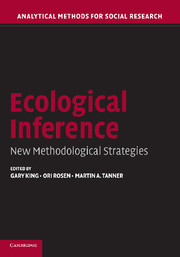Book contents
- Frontmatter
- Contents
- Contributors
- Preface
- INTRODUCTION
- PART ONE
- PART TWO
- PART THREE
- PART FOUR
- 13 Common Framework for Ecological Inference in Epidemiology, Political Science, and Sociology
- 14 Multiparty Split-Ticket Voting Estimation as an Ecological Inference Problem
- 15 A Structured Comparison of the Goodman Regression, the Truncated Normal, and the Binomial–Beta Hierarchical Methods for Ecological Inference
- 16 A Comparison of the Numerical Properties of EI Methods
- Index
14 - Multiparty Split-Ticket Voting Estimation as an Ecological Inference Problem
Published online by Cambridge University Press: 18 May 2010
- Frontmatter
- Contents
- Contributors
- Preface
- INTRODUCTION
- PART ONE
- PART TWO
- PART THREE
- PART FOUR
- 13 Common Framework for Ecological Inference in Epidemiology, Political Science, and Sociology
- 14 Multiparty Split-Ticket Voting Estimation as an Ecological Inference Problem
- 15 A Structured Comparison of the Goodman Regression, the Truncated Normal, and the Binomial–Beta Hierarchical Methods for Ecological Inference
- 16 A Comparison of the Numerical Properties of EI Methods
- Index
Summary
ABSTRACT
The estimation of vote splitting in mixed-member electoral systems is a common problem in electoral studies, where the goal of researchers is to estimate individual voter transitions between parties on two different ballots cast simultaneously. Because the ballots are cast separately and secretly, however, voter choice on the two ballots must be recreated from separately tabulated aggregate data. The problem is therefore of one of making ecological inferences. Because of the multiparty contexts normally found where mixed-member electoral rules are used, furthermore, the problem involves large-table (R × C) ecological inference. In this chapter we show how vote-splitting problems in multiparty systems can be formulated as ecological inference problems and adapted for use with King's (1997) ecological inference procedure. We demonstrate this process by estimating vote splitting in the 1996 Italian legislative elections between voters casting party-based list ballots in proportional representation districts and candidate-based plurality ballots in single-member districts. Our example illustrates the pitfalls and payoffs of estimating vote splitting in multiparty contexts, and points to directions for future research in multiparty voting contexts using R × C ecological inference.
- Type
- Chapter
- Information
- Ecological InferenceNew Methodological Strategies, pp. 333 - 350Publisher: Cambridge University PressPrint publication year: 2004
- 3
- Cited by

